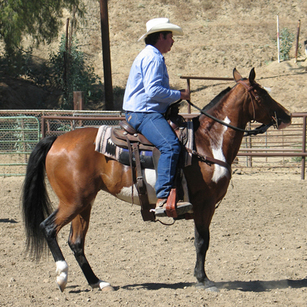My Horse Is Trying to Kill Me
July 10, 2014
Written by: Keith Hosman
Written by: Keith Hosman
|
Question: In March, I bought a 4 year old Rocky Mountain gelding to become a trail horse. The third time I rode him, he threw me and I wasn't able to ride for a few months. I did a lot of ground work with him over the past few months. I found a trainer/friend to help me work with him also. She deals with appies and doesn't know much about him. I bought a couple of your books and I feel that with their help, I'll have no trouble getting him going. My biggest problem now is that everyone is harping on me that he'll never be a trail horse and I'll never be able to ride him. My trainer/friend doesn't want to let me ride him again. She wants to just lunge the heck out of him and call it good. My horse, Scooter, is very smart and does anything I want him to, occasionally grudgingly. My question to you is do you think that because of his breed, I'm wasting my time, like my friend keeps telling me?
If my friends and trainer all told me to stay off my horse, here's what I'd do. 
Answer: “My horse is trying to kill me; my friends tell me I’m nuts; please don’t blame my horse (Skoal’s Wrecking Ball) because we’re soul mates and if you could just see how he looks at me.”
I’ve heard this theme many times and when I’m given a long list of serious problems followed by “but he’s really smart and sweet, the horse I always dreamt of” I know I’m talking to someone in danger of letting their emotions get the better of them. And here, true to form, despite the substantial challenges detailed in your email, (“My biggest problem is that everyone is saying I'll never be able to ride him”), you end with an inconsistency, a non sequitur: “My horse is very smart and does anything I want him to”). This final contrary sentence suggests someone searching (rationalizing, really) for a way to keep doing what they’re doing despite all evidence that a radically different course of action must be taken. Whether this describes you personally or not, the advice remains the same: Do do everything you can to search out a happy solution – but know and accept the fact going forward that some horses are not meant for some people. Don’t allow emotion to cloud objective thinking. Don’t rationalize your way onto a horse that’s dangerous to your health. Do listen to the people around you. This is the change I’d make: I’d send the horse away to somebody who specializes in thoroughly breaking horses (that means dead broke and bomb proof - not “started”) and it’d stay there as long as that person thought necessary (certainly several months or more). I wouldn’t try to “be a part” of that training either – it’d cost me a ton more money, I’d get in the trainer’s way, and everything would take much, much longer. Anything the trainer does in that handful of time is for and about making the horse better and the two of them need to be left alone. If the trainer comes recommended, we shouldn’t have to worry about the methods he or she might use. While the horse is getting its re-training, I (the rider) would invest my own time taking lessons and getting better with horses in general. When the horse returns, I’d work with a local trainer and I’d follow that trainer’s advice, given common sense constraints. If what I see and hear from that particular trainer doesn’t click for me and my horse, I’d find another trainer – but I’d also accept what a majority of experienced horse people tell me. If two trainers in a row tell me the horse isn’t right for me I’d find another horse.
Tip: Teach almost anything to your horse with the "Clock Work Exercise." That's a chapter in the basic training book "What I'd Teach Your Horse" - and you can hear the whole section right now for FREE on audio when you click here.
|
|

